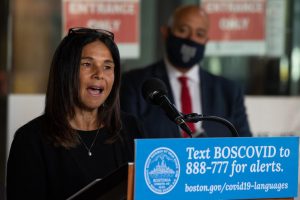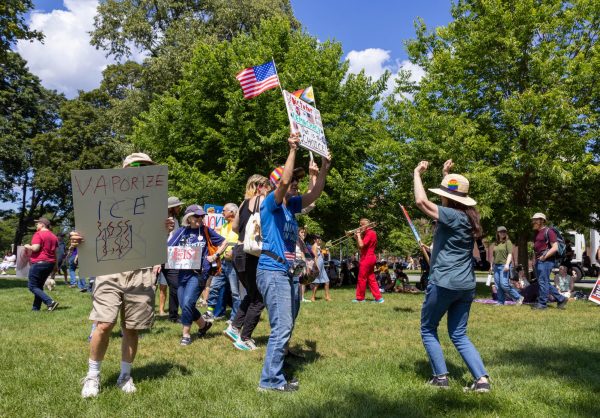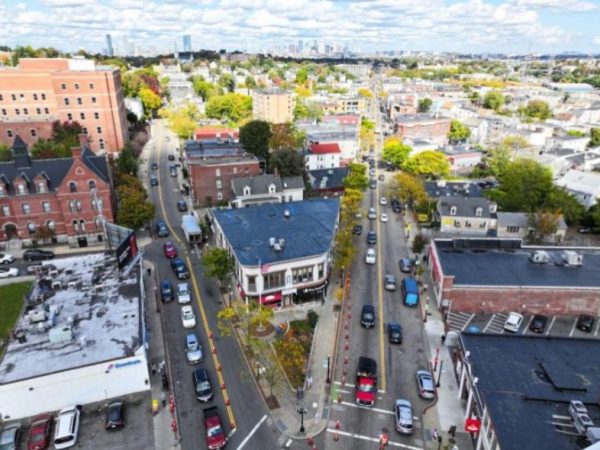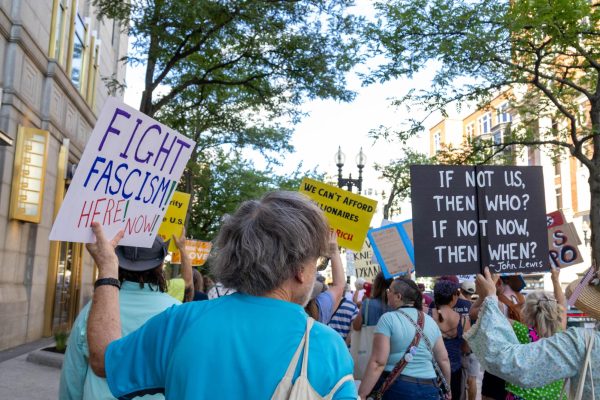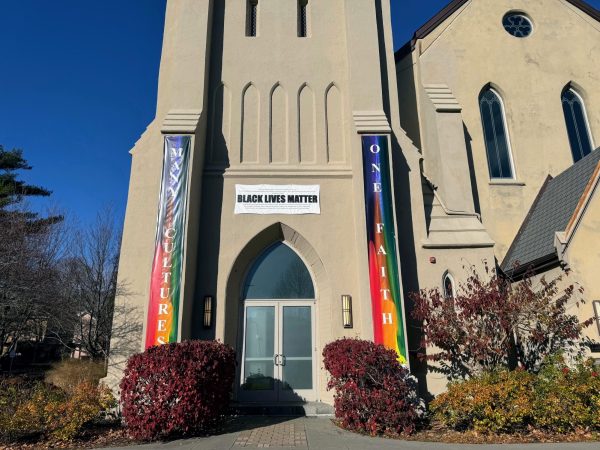COVID-19 Vaccine Updates
Stay informed about phases of the COVID-19 vaccine rollout in Massachusetts. We will update this page as news breaks and provide resources when available.
The rollout of COVID-19 vaccine has begun across the country, see which groups of people are prioritized to get the shots, when can you get the vaccine, where to get it and weekly updates of the rollout here. Information on this page is from mass.gov, the state of Massachusetts’ official website.
The general public 16 years and older is now eligible for the COVID vaccine
April 19, 2021
All residents may preregister to book an appointment at a mass vaccination site at mass.gov/COVIDVaccine. The full vaccination timeline can be found at mass.gov/COVIDVaccinePhases.
To find a Boston vaccination site. Click here for a map or here for a list of locations.
In an effort to expand vaccine distribution to Boston residents of color and seniors, the city of Boston launched the Equity in Vaccine Access line at 617-635-5555. Residents can call the number for help scheduling an appointment.
Johnson & Johnson Vaccines Paused in MA
April 14, 2021
Effective April 13, the state paused the use of the Johnson & Johnson COVID-19 vaccine for vaccine administrations in compliance with the Food and Drug Administration and the Center for Disease Control and Prevention’s recommendation, Gov. Baker announced.
Individuals who currently have an appointment scheduled for the Johnson & Johnson vaccine are advised to contact their providers or the vaccination clinic where their appointment is scheduled.
Six cases of serious medical conditions resulted from an estimated 7 million doses of the Johnson & Johnson vaccine, according to the FDA and CDC. The vaccine’s distribution has been paused out of caution as federal and medical experts investigate these cases.
Severe symptoms, such as severe pain in the abdomen, severe headaches and severe leg pains have been reported within two weeks of receiving the Johnson & Johnson vaccine. Individuals who experience these symptoms after receiving the Johnson & Johnson vaccine are advised to contact their clinicians.
Hynes Convention Center vaccination site will reserve 20,000 first doses for disproportionately impacted communities
20,000 first-dose vaccine appointments will be reserved for residents from disproportionately impacted communities, cities and towns with the highest numbers of COVID-19 case, at the Hynes Convention Center in the week of April 19 to April 25, Gov. Baker announced. The disproportionately impacted communities communities, identified earlier by the administration, are Boston, Brockton, Chelsea, Everett, Fall River, Fitchburg, Framingham, Haverhill, Holyoke, Lawrence, Leominster, Lowell, Lynn, Malden, Methuen, New Bedford, Randolph, Revere, Springfield, and Worcester.
These appointments will be scheduled by grassroots outreach efforts by community partners including The Red Sox Foundation, The Base, El Mundo, Archipelago Strategies Group, Health Care for All and the Boston Public Health Commission.
All individuals 16 years and older will be eligible for the COVID-19 vaccine on April 19. Any unfilled appointments for this week will be booked through the state’s pre-registration system. Individuals may preregister for a vaccine appointment at vaccinesignup.mass.gov.
Individuals 16 and older with at least one certain medical condition are now eligible for the COVID-19 vaccine
April 2, 2021
Massachusetts residents 16 years old and older with at least one certain medical condition are now eligible for the COVID-19 vaccine, and the state added type 1 diabetes, HIV, a substance use disorder, and being overweight to the list of health conditions that qualify individuals for the COVID-19 vaccine, Gov. Baker announced.
Being overweight or obese is determined by an individual’s body mass index, according to the Center for Disease Control and Prevention. The CDC’s website allows people to calculate their body mass index here.
All residents may check their eligibility for the vaccine at mass.gov/covid-19-vaccine.
Eligible residents may find available vaccine appointments at vaxfinder.mass.gov.
Eligible medical conditions include:
- Cancer
- Chronic kidney disease
- Chronic lung diseases including COPD, asthma (moderate-to-severe), Interstitial lung disease, cystic fibrosis and pulmonary hypertension
- Dementia or other neurological conditions
- Diabetes (type 1 or type 2)
- Down syndrome
- Heart conditions like heart failure, coronary artery disease, cardiomyopathies or hypertension
- HIV infection
- An immunocompromised state
- Liver disease
- Obesity
- Pregnancy
- Sickle cell disease or thalassemia
- Smoking
- Solid organ or blood stem cell transplant
- Stroke or cerebrovascular disease
- Substance use disorders
Eligible residents can pre-register for vaccine appointments at mass vaccination sites only, starting March 12
March 10, 2021
The pre-registration system will replace the current online appointment booking system when it launches on Friday, Governor Baker announced. To access the pre-registration site, eligible residents can go to mass.gov/COVIDvaccine.
The preregistration site will only include appointments at the state’s seven mass vaccination sites including Gillette Stadium, Fenway Park (moving to Hynes Convention Center March 27), Reggie Lewis Center, Danvers DoubleTree Hotel, Natick Mall, Eastfield Mall – Springfield and Former Circuit City – Dartmouth. Baker said he anticipates that more vaccination sites will be added to the preregistration site in April.
After pre-registering, residents will receive a confirmation via email, phone, or text and receive weekly updates on their status. Residents may opt out of pre-registration at any time if they are able to make an appointment elsewhere.
When an appointment becomes available at a mass vaccination site, the resident will be notified and have 24 hours to accept the appointment offer. If an appointment is not accepted within 24 hours, the resident will return to the queue and wait for another available appointment.
Residents who do not have internet access or have difficulty using the website may call 2-1-1, the COVID-19 Vaccine Scheduling Resource Line. The pre-registration form allows family members, caregivers or other companions to fill out the form on behalf of older residents and those unable to use the form.
The preregistration system will not impact this week’s appointments that will be released on Thursday, March 11 for mass vaccination sites.
When can I get the COVID-19 vaccine?
Residents in these groups are currently eligible for the vaccine:
- People who are 75 or older
- People who are 55 or older
- People with 1 or more certain medical conditions. See below for a list of eligible medical conditions.
- People who live or work in low income and affordable senior housing
- K-12 educators, K-12 school staff, and child care workers
- Certain workers
Eligible medical conditions:
- Cancer
- Chronic kidney disease
- Chronic lung diseases, including COPD (chronic obstructive pulmonary disease), asthma (moderate-to-severe), interstitial lung disease, cystic fibrosis, and pulmonary hypertension
- Dementia or other neurological conditions
- Diabetes (type 1 or type 2)
- Down syndrome
- Heart conditions (such as heart failure, coronary artery disease, cardiomyopathies or hypertension)
- HIV infection
- Immunocompromised state (weakened immune system)
- Liver disease
- Overweight and obesity. Calculate your BMI here.
- Pregnancy
- Sickle cell disease or thalassemia
- Smoking, current or former
- Solid organ or blood stem cell transplant
- Stroke or cerebrovascular disease, which affects blood flow to the brain
- Substance use disorders
Upcoming Eligibility
Starting April 19, 2021, any resident 16 years or older will be eligible to schedule vaccine appointments.
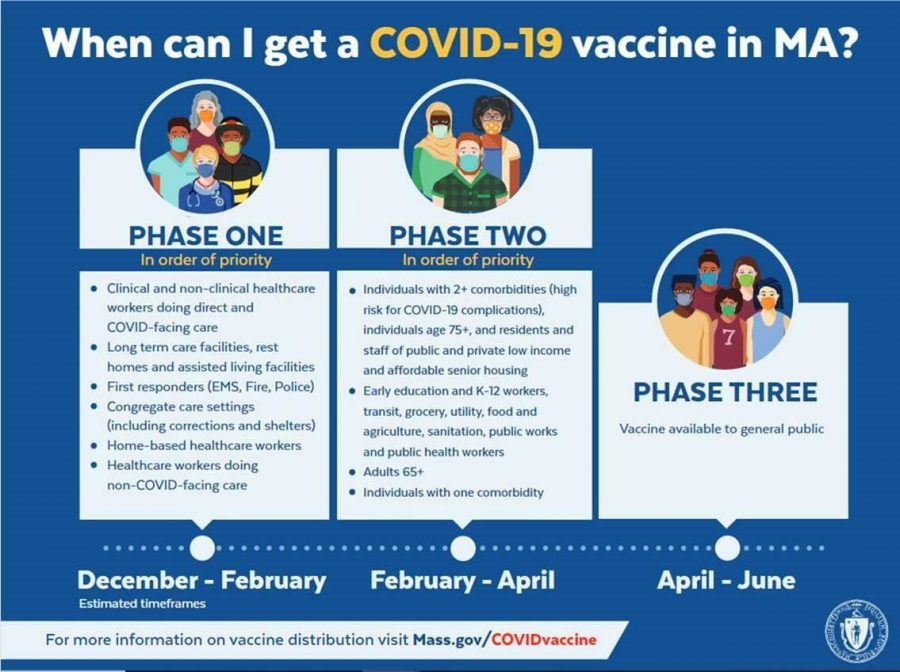
Where can I get the COVID-19 vaccine?
Individuals age 75 and older are eligible beginning Feb. 1, 2021. Select vaccination locations will have appointments available beginning Wednesday, Jan. 27 for individuals age 75 or older. A map of all vaccination locations with contact details and sign-up information for individuals currently eligible to be vaccinated is available on mass.gov.
According to the state, individuals must present proof of their eligibility to receive the vaccine. All sites require appointments.
Below are the vaccination locations in Boston:
1. Boston Fenway Park, 4 Jersey St, Boston, MA 02215, serves eligible populations statewide, indoor site. Link to register for an appointment coming soon.
2. Boston Reggie Lewis Center (Roxbury Community College), 1350 Tremont St, Roxbury, MA 02120, serves eligible populations in Boston, indoor site. Link to register for an appointment coming soon.
3. Boston South Boston Community Health Center, 409 W Broadway, South Boston, MA 02127, serves eligible populations statewide indoor site. Visit bit.ly/38SUWs2 to book appointment and register. Please arrive at back door off of Silver St. No parking available. Opens Monday-Friday.
When the vaccine is available to the general public, public vaccine clinics will be available on the CDC’s interactive website: vaccinefinder.org. You will also be able to check with your primary care provider, local pharmacy or local health department.Most health care workers will be vaccinated at their place of employment.
First responders can visit mass.gov/FirstResponderVaccine for COVID-19 vaccine locations and more information.
Individuals living and working in long term care will be vaccinated as part of the Federal Pharmacy Partnership Program
Vaccination for individuals in other congregate settings (e.g., group homes, shelters, corrections) will be coordinated by the management of those facilities.
How many doses are there in the COVID-19 vaccine?
According to Massachusetts Department of Public Health, a person is counted as fully vaccinated if they have received the number of doses required to complete the COVID-19 vaccine series. Moderna and Pfizer vaccine, which are being administered in Massachusetts, require two doses to complete the series.
How many COVID-19 vaccine doses has Massachusetts administered?
Data as of April 15, 2021. Data updated each Thursday by 5 p.m.
There has been a total of 5,511,370 doses shipped to Massachusetts. A total of 4,739,598 doses, including the first and second doses, have been administered so far. 28% of the doses administered went to people working in hospitals. A total of 1,875,316 individuals have been fully vaccinated.
Suffolk county has so far received 1,250,501 COVID-19 vaccine doses, more than any other county in Massachusetts. The total COVID-19 vaccine doses, first and second doses included, shipped to Suffolk county so far is at 156% of its population.
COVID-19 call center for residents 75 and older
Governor Baker announced that the Commonwealth of Massachusetts launched a new call center for residents who are 75 and older are now able to make COVID-19 vaccination appointments via phone.
The call center was launched to assist individuals 75 and older who do not have internet access or someone who can help them make an appointment online, Baker said.
To make an appointment, individuals can dial 2-1-1 and select the vaccination prompt. The call center’s availability is Monday through Friday from 8:30 a.m. to 5 p.m.
It will be staffed by over 500 representatives who can speak English and Spanish, and translators for about 100 more languages will be available, Baker said. The call center workers will have the same access to available vaccination appointments that online users will have.
Call center workers will verify the caller’s age and help them find the nearest vaccination center and make an appointment. If there are no available appointments in a nearby center, callers will be offered the chance to be placed on a callback list, and they will receive a call when more appointments are available near them.
This resource is only available to residents 75 and older, and Baker expects that residents 65 and older may be able to use it to make appointments when they are eligible for vaccinations. Baker urged residents to continue using the online vaccination appointment scheduler and said that it is the fastest method for those able to navigate the website.
Baker also announced the launch of a new public awareness campaign, “Trust the Facts. Get the Vax.” This $2.5 million campaign aims to encourage residents to get a COVID-19 vaccination, especially people of color and residents in low-income communities.
The campaign relies on survey results of 1,000 Massachusetts residents in which people of color and residents in low-income communities are disproportionately represented in the population of people who are hesitant to get vaccinated. Baker said that the campaign aims to build trust in medical professionals and COVID-19 vaccination data.
This multimedia campaign includes advertisements on television, radio, social media, search engines, and streaming services. It will run for the next five months in 10 languages: English, Spanish, Portuguese, Cape Verdian, Haitian Creole, Vietnamese, Russian, Arabic, Albanian, traditional Chinese, and simplified Chinese. An American Sign Language version of the advertisement will be available online.
COVID-19 Vaccine Frequently Asked Questions, as published on mass.gov
Before getting vaccinated
1. Will I have to pay for the vaccine?
The vaccine is being provided free of charge to all individuals by the federal government. Insurance companies are also committed to not charging any out-of-pocket fees or co-payments related to COVID-19 vaccine administration, and all health care provider sites that receive COVID-19 vaccine must agree to not charge patients any out-of-pocket fees or deny anyone vaccination services.
2. May undocumented immigrants receive the vaccine for free?
Yes. The vaccine itself is free for all Massachusetts residents. Health insurance (including Medicare and Medicaid) will cover the cost of administering the vaccine. For patients without health insurance, health care providers may request reimbursement from the federal government for the cost of administering vaccine to undocumented immigrants.
3. Will getting the vaccine adversely impact a patient’s immigration status?
No. The federal government has confirmed that it will not consider COVID-19 treatment (including a vaccine) as part of a determination of whether someone is a “public charge” or as it relates to the public benefit condition for certain individuals seeking an extension of stay or change of status, even if the vaccine is paid for by Medicaid or other federal funds.
4. Is a patient’s vaccination record protected from disclosure?
The Department of Public Health will maintain an electronic record of each patient in Massachusetts who receives the COVID-19 vaccine. The vaccine database is kept confidential like a patient’s medical record with her doctor.
5. Will the COVID-19 vaccine be mandatory?
The Department of Public Health is not mandating the COVID-19 vaccine. It is a voluntary program. The COVID-19 vaccine has been shown to be highly effective at preventing illness and it is an important tool in the fight against the pandemic.
6. Will I need to be tested for COVID-19 before getting the vaccine?
No, a COVID-19 test is not needed before getting the vaccine.
7. Should someone who is COVID-19-positive receive the vaccine?
Not if they are symptomatic. Vaccination of people who are known to have COVID-19 should be delayed until they no longer have symptoms.
8. Should people who have had COVID-19 be vaccinated?
Yes, people who have previously had COVID-19 should be vaccinated.
9. What are the benefits of getting a COVID-19 vaccine?
We understand that some people may be concerned about getting vaccinated now that COVID-19 vaccines are available in the United States. Please visit Benefits of Getting a COVID-19 Vaccine | CDC for a summary of the benefits of COVID-19 vaccination based on what we currently know.
10. Why would a vaccine be needed if we can do other things, like social distancing and wearing masks, to prevent the virus that causes COVID-19 from spreading?
Stopping a pandemic requires using all the tools available. Vaccines work with your immune system so your body will be ready to fight the virus if you are exposed. Other steps, like covering your mouth and nose with a mask and staying at least 6 feet away from others, help reduce your chance of being exposed to the virus or spreading it to others. Together, COVID-19 vaccination and following CDC’s recommendations to protect yourself and others will offer the best protection from COVID-19. (source: Frequently Asked Questions about COVID-19 Vaccination | CDC as of 12/21/20)
11. What is an Emergency Use Authorization?
The Pfizer and Moderna vaccines have received Emergency Use Authorization (EUA) from the federal Food and Drug Administration. Learn more about what this means – and other information about the vaccines – in their EUA fact sheets for recipients and caregivers. These factsheets can be found at:
12. Who is authorized to administer vaccinations?
In addition to licensed health care providers, like doctors and nurses and pharmacists, according to the federal CARES Act, vaccinations may be administered by pharmacy interns, certified pharmacy techs, paramedics, and certified medical assistants, under the direct supervision of a primary care provider. When available, all health care institutions including hospitals, community health centers, and private medical offices will have access to the COVID-19 vaccine to vaccinate their patients. Pharmacies including large retail outlets such as CVS, Walgreens, Osco, and Walmart will have access to the vaccine and will be able to vaccinate their customers. Vaccine will likely also be made available to local health departments for vaccinating their local residents at public clinics.
This COVID-19 Vaccinators chart lists all of the different groups of individuals who can possess and administer COVID-19 vaccines.
During your appointment
1. What can I expect at my appointment to get vaccinated for COVID-19?
Please visit What to Expect at Your Appointment to Get Vaccinated for COVID-19 | CDC for tips on what to expect when you get vaccinated, what information your provider will give you, and resources you can use to monitor your health after you are vaccinated.
2. Do I need to wear a mask when I receive a COVID-19 vaccine?
Yes. CDC recommends that during the pandemic people wear a mask that covers their nose and mouth when in contact with others outside your household, when in healthcare facilities, and when receiving any vaccine, including a COVID-19 vaccine. Anyone who has trouble breathing or is unable to remove a mask without assistance should not wear a mask. For more information, visit considerations for wearing masks. (source: Frequently Asked Questions about COVID-19 Vaccination | CDC as of 12/21/20)
3. Can I choose which vaccine I receive?
No. Recipients will receive the vaccine offered to them when they attend a vaccination clinic. Both vaccines are highly effective and safe.
4. How long do I have to wait between the first and second dose of the COVID-19 vaccine?
The Pfizer vaccine requires two doses to be given 21 days apart. The Moderna vaccine requires two doses to be given 28 days apart.
5. Will I receive anything to show proof of vaccination?
You should receive a vaccination card or printout that tells you what COVID-19 vaccine you received, the date you received it, and where you received it. You should receive a paper or electronic version of a fact sheet that tells you more about the specific COVID-19 vaccine you are being offered. Each authorized COVID-19 vaccine has its own fact sheet that contains information to help you understand the risks and benefits of receiving that specific vaccine. The factsheets can be found at Pfizer-BioNTech COVID-19 Vaccine EUA Fact Sheet for Recipients and Caregivers (fda.gov) and Moderna COVID-19 Vaccine EUA Fact Sheet for Recipients and Caregivers (fda.gov)
After getting vaccinated
1. What should I do if I experience symptoms after receiving a COVID-19 vaccine, such as fever and body aches?
If you have any significant pain or discomfort, talk to your healthcare provider, who may recommend over-the-counter medicine, such as ibuprofen or acetaminophen. To reduce pain and discomfort where you got the shot apply a clean, cool, wet washcloth over the area, and use or exercise your arm. To reduce discomfort from fever, drink plenty of fluids and dress lightly. In most cases, discomfort from fever or pain is normal, but contact your healthcare provider if:
- the redness or tenderness where you got the shot increases after 24 hours
- your side effects are worrying you or do not seem to be going away after a few days
2. How do I report if I have any side effects after getting the COVID-19 vaccine?
V-safe is a smartphone-based tool that uses text messaging and web surveys to provide personalized health check-ins after you receive a COVID-19 vaccination. Through v-safe, you can quickly tell CDC if you have any side effects after getting the COVID-19 vaccine. Depending on your answers, someone from CDC may call to check on you and get more information. And v-safe will remind you to get your second COVID-19 vaccine dose if you need one. To sign up for v-safe, please visit V-safe After Vaccination Health Checker | CDC.
3. How long after getting the COVID-19 vaccine does it take to be effective?
It typically takes a few weeks for the body to build immunity after vaccination. That means it’s possible a person could be infected with the virus that causes COVID-19 just before or just after vaccination and get sick. This is because the vaccine has not had enough time to provide protection.
4. How long does protection from the COVID-19 vaccines last?
We do not have data yet to say for how long the COVID-19 vaccines will provide protection from getting sick even if you do get COVID-19. Experts continue to conduct more studies about whether the vaccines also keep people from spreading COVID-19.
5. Does immunity after getting COVID-19 last longer than protection from COVID-19 vaccines?
The protection someone gains from having an infection (called natural immunity) varies depending on the disease, and it varies from person to person. Since this virus is new, we don’t know how long natural immunity might last. Some early evidence—based on some people— seems to suggest that natural immunity may not last very long. Regarding vaccination, we won’t know how long immunity lasts until we have a vaccine and more data on how well it works. Both natural immunity and vaccine-induced immunity are important aspects of COVID-19 that experts are trying to learn more about, and CDC will keep the public informed as new evidence becomes available. (source: Frequently Asked Questions about COVID-19 Vaccination | CDC as of 12/21/20)
6. How effective is one dose of a COVID-19 vaccine compared to two doses?
The COVID-19 vaccines were not studied for use as a single dose. People should get both doses of the vaccine to be fully vaccinated in order to be effective.
7. Do I have to follow the Travel Order if I have received a COVID-19 vaccine?
Yes. At this time, vaccinated individuals must continue to comply with the Governor’s Travel Order and related testing and quarantine requirements. It is important for everyone to continue using all the public health measures available to help stop this pandemic. Cover your mouth and nose with a mask when around others, stay at least 6 feet away from others, avoid crowds, and wash your hands often.
8. Do I need to wear a mask and avoid close contact with others if I have received two doses of the vaccine?
Yes. While experts learn more about the protection that COVID-19 vaccines provide under real-life conditions, it will be important for everyone to continue using all the tools available to us to help stop this pandemic, like covering your mouth and nose with a mask, washing hands often, and staying at least 6 feet away from others. Together, COVID-19 vaccination and following CDC’s recommendations for how to protect yourself and others will offer the best protection from getting and spreading COVID-19. Experts need to understand more about the protection that COVID-19 vaccines provide before deciding to change recommendations on steps everyone should take to slow the spread of the virus that causes COVID-19. Other factors, including how many people get vaccinated and how the virus is spreading in communities, will also affect this decision. (source: Frequently Asked Questions about COVID-19 Vaccination | CDC as of 12/21/20)
9. When can I stop wearing a mask and avoiding close contact with others after I have been vaccinated?
There is not enough information currently available to say if or when CDC will stop recommending that people wear masks and avoid close contact with others to help prevent the spread of the virus that causes COVID-19. Experts need to understand more about the protection that COVID-19 vaccines provide before making that decision. Other factors, including how many people get vaccinated and how the virus is spreading in communities, will also affect this decision. (source: Frequently Asked Questions about COVID-19 Vaccination | CDC as of 12/21/20).
For more information and questions about the COVID-19 vaccine, please visit mass.gov.





